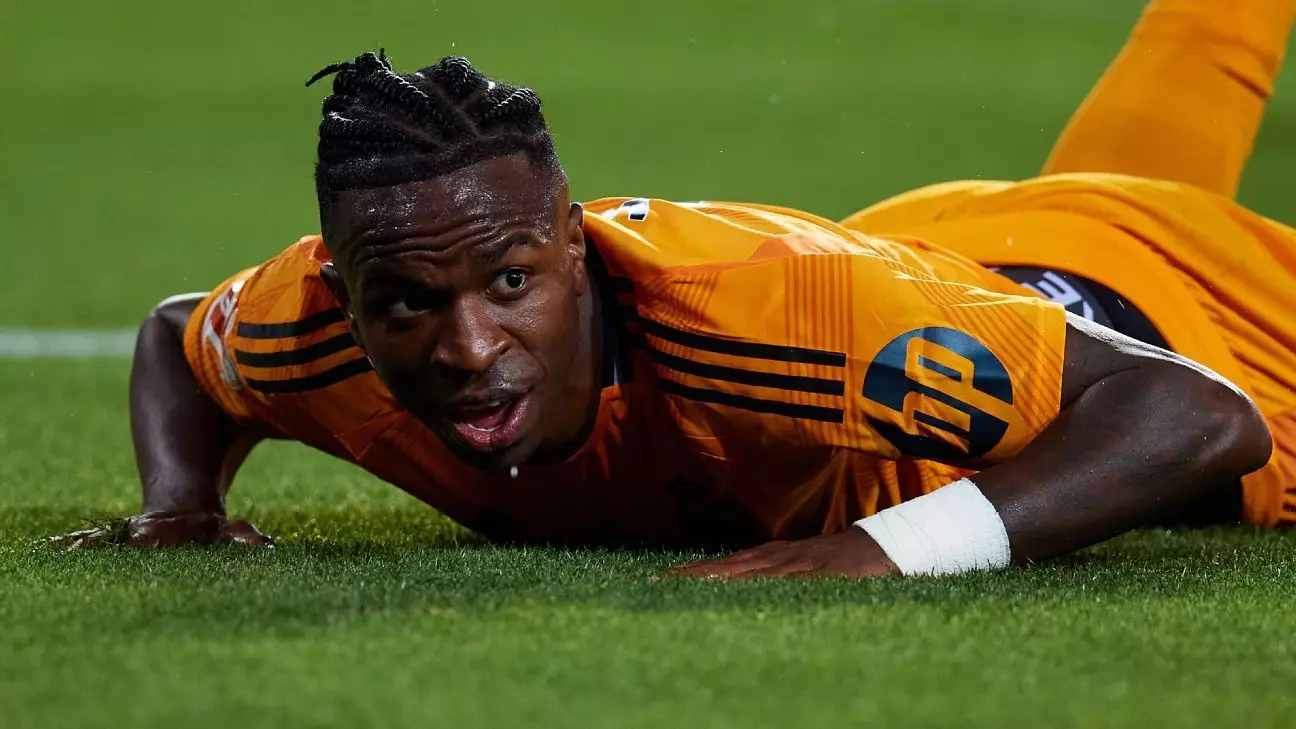The recent uproar surrounding Vinicius Junior’s red card during the match against Valencia shines a light not only on the Brazilian’s temperament but also on the broader implications of the treatment he receives within the football community. While it’s easy to hone in on the disciplinary actions—in this case, a two-match suspension that ironically won’t affect his eligibility for the Spanish Supercopa—the nuances of this situation reveal a troubling landscape in which racial dynamics play an influential role in the narratives constructed around star players like Vinicius.
The appeal by Real Madrid following Vinicius’s sending off speaks volumes about the club’s commitment to its player, but it also underlines a deeper concern regarding how emotions and inevitable provocations can influence decisions made on the pitch. Vinicius’s emotional reactions are often exacerbated by the intense pressure from fans and opponents alike, leading to outbursts that overshadow his phenomenal talent. However, in this moment of scrutiny, it’s vital to acknowledge that while he indeed reacts dramatically to provocations, the context of these actions—especially given the vitriol he often faces—plays a crucial role in interpreting his behavior.
The contrast between Vinicius Junior and Sergio Ramos brings to light a staggering disparity in how players are perceived based on their backgrounds and the color of their skin. Ramos, already a celebrated figure during his early years at Real Madrid, faced multiple disciplinary sanctions, amassing ten red cards by a similar point in his career. Despite his fiery reputation, he was celebrated for his “passion” and “leadership” qualities. Yet, as a Black Brazilian, Vinicius’s comparatively mild disciplinary record—two red cards in nearly 300 appearances—has led to a narrative framing him as immature and emotionally unstable.
This dichotomy raises uncomfortable questions about the footballing culture in Spain and how narratives are shaped by long-standing societal biases. The reaction from the media and fans to comparative misconduct is not just a matter of differing tendencies; it is a reflection of systemic issues that question the fairness of treatment players receive based on the traits they embody. The contrasting media treatment of Ramos and Vinicius provides a striking case study in privilege, acceptance, and condemnation.
Vinicius Junior’s situation is representative of a larger, ongoing battle against racial discrimination in sports. The instances of racial abuse he has encountered from stands reflect a troubling trend in football that is being inadequately addressed. These instances create a heightened sense of scrutiny with which he must contend, often resulting in situations where he feels compelled to defend himself against both personal and institutional prejudice.
While it is undeniable that Vinicius must take responsibility for his reactions, it is equally critical to note the backdrop against which these reactions unfold. His outbursts and apparent frustrations are emblematic of the larger pressures that come into play when players, particularly those of a marginalized background, are faced with unrelenting scrutiny both on and off the pitch. Society must consider how these dynamics complicate the narrative of sportsmanship and emotional fortitude in a way that isn’t held to the same standards across the board for all players.
Carlo Ancelotti’s remarks about Vinicius shed some light on the coach’s understanding of the cultural and emotional contexts surrounding his players. He emphasized that Vinicius has indeed made strides in his discipline and maturity, which deserves acknowledgment rather than ridicule. If coaches and players can foster an environment of understanding, it may encourage development rather than exacerbate a cycle of blame or condemnation.
However, media coverage often seems to thrive on controversy and outrage, with pundits exploiting situations for sensationalism. Ancelotti’s constructive comments risk getting overshadowed by hyperbolic narratives that paint Vinicius as a volatile presence on the pitch. With certain media outlets leaning into an “us vs. them” mentality, it places additional pressure on Vinicius, potentially leading to further inappropriate reactions during matches.
As Vinicius Junior continues to navigate his career, the need for introspection and fair treatment becomes palpably evident. He encompasses not only exceptional talent but also embodies the challenges many athletes face regarding expectations, identity, and societal biases. Moving forward, it’s essential for clubs, players, and fans to foster environments of understanding and support, recognizing the significant weight that cultural narratives can carry.
In the end, while Vinicius’s rapid ascension to footballing stardom is laudable, so too is the necessity for compassionate dialogue around the pressures he faces. Greater awareness surrounding issues of race and temperament in sports can pave the way for healthier perceptions and help to redefine what constitutes acceptable behavior from players of all backgrounds.
